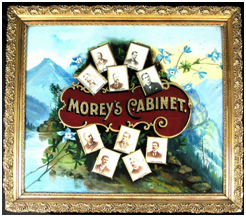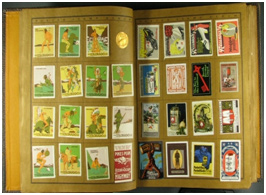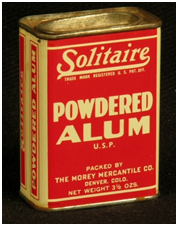Story
Rediscovering the Morey Mercantile
In our last blog, Leigh and I wrote about our adventure with a mincemeat pie recipe from a cookbook distributed by the Morey Mercantile of Denver. What we didn’t tell you is how we came to know and appreciate the Morey Mercantile - and how our findings led to a new exhibit opening in advance of the upcoming major traveling exhibition, Food: Our Global Kitchen.
My interest in the Morey Mercantile began two years ago when a donor called and offered History Colorado his substantial collection of Morey tins, signs, cookbooks, crates, hats, advertisements and bottles. To determine what we might accept and why or why not, I had to do some research. It didn’t take me long to discover that we already had items in our collection related to the mercantile. A little more research and I soon realized that the Tattered Cover Book Store on 16th Street in downtown Denver originally housed the Morey Mercantile.
Okay, so here’s just a little bit of what I learned about the Morey Mercantile. Established in 1884 by Chester Stephen Morey, it not only sold coffee, spices and canned goods but offered customers brooms, matches, writing tablets and cigars. In 1896, construction began on the new six-story Morey Mercantile, covering five city lots and located at the corner of Wynkoop and 16th—today’s Tattered Cover. The new building had a roasting plant, spice-grinding department, extract laboratory and print shop. In 1902, Chester S. Morey launched the Solitaire Brand, which became the company’s best seller in top-quality canned goods such as spices, coffee, and canned fruits and vegetables.
As the business grew, in 1913 Chester’s son John W. Morey became company president; a Yale graduate, he’d started at the company in 1901 and worked his way up. After his father’s death in 1922, John continued to grow the company and, in time, the Morey Mercantile became the largest grocery business in the West in terms of sales, territory and number of employees. By 1925, the Morey operations occupied a total of 253,000 square feet in Denver. By 1934, the company employed roughly 500 people at the Denver location and eighteen other branches in Colorado, Wyoming, New Mexico and Nebraska. Consolidated Foods Corporation, a national grocery company in Chicago, bought the Morey Mercantile in 1956, absorbing its products into Consolidated’s operations. That same year John W. Morey died.
Now, back to the 2012 Morey donation to History Colorado. In addition to a desk, manuscript collection and photos, I also found a 1961 article, “The Morey Mercantile,” which appeared in History Colorado’s old publication The Colorado Magazine. Written by former Morey employee William L. Myatt, the article gave a detailed history of the Morey Mercantile. Myatt also mentioned artifacts and photographs given to History Colorado that same year. Of particular interest to me was a piece pictured in the article with the words Morey’s Cabinet on it. This caught my eye because I’d seen the piece before and, in fact, had worked to have it conserved around 2005.
Why does this matter, you ask? Well, it matters because the piece, originally noted as a “sign” in our collection, is actually original artwork for Morey brand cigars and features photographs of Morey employees. Before we found the article, the piece was listed as a “found in collection” item and was missing its accession number and history. The article ultimately helped me and Leigh to reconnect the sign, its donor and its story and to find other Morey items donated in 1961 that had lost their own stories over time.

This is the original artwork for Morey cigars - noted at first as a “sign” in our collection - that caught my eye in the 1961 Colorado Magazine article.
My research definitely paid off: not only did I rediscover the Morey Mercantile, but Leigh and I linked items in our collection with the Morey history and each other. In the end, my research also helped me see the value of adding 140 of the items offered. This, however, is not the end of Leigh’s and my adventure with the Morey Collection. We were so excited by the Morey Mercantile that we began sharing the story with colleagues. As a result, History Colorado decided to do an exhibit on the Morey Mercantile. Opening April 25, the Morey exhibit is developed by students at Morey Middle School—you guessed it, named after Chester S. Morey.
By Alisa Zahller, Curator Art and Design
“It feels like the stars are aligning...”
Not long ago, someone called History Colorado to ask whether we had any material in our collection related to the Morey Mercantile or the Morey family. With the recent donation, the upcoming Morey exhibit and all the extensive research we’d done on HC’s existing Morey collection, the timing couldn’t have been more perfect. It turns out that the man requesting the information was Jack Ferguson, John W. Morey’s grandson. Alisa and I were pleasantly surprised by this new turn of events; we had so much to tell Mr. Ferguson and so many questions to ask. Despite having a large collection related to the mercantile, we knew very little about the family.
The timing couldn’t have been better for Jack, either. His son, Mark, is opening a new restaurant in Denver called Solitaire—that’s right, named after the Morey Mercantile brand. We invited Jack and his sons to the History Colorado Center to see the Morey Mercantile collection and to meet with the Morey Middle School students who are developing the Morey exhibit, set to open on April 25. It was an opportunity not only for Alisa and me to ask questions of the family but for them to ask questions of us. By connecting with descendants of donors we, and in turn our visitors, are able to learn much more about the collections we hold.
One question we had was this: Why did Jack’s mother, Katherine Morey Ferguson, have so many German stamps in her poster stamp collection? From what we learned, it may simply have been because her uncle was German.

Katherine Morey Ferguson Poster Stamp Album, H.6444.5Alisa and I selected a few of the stamps in this album to reproduce and exhibit large-scale at the History Colorado Center in anticipation of the upcoming exhibit Food: Our Global Kitchen, opening Memorial Day.
We hope to learn more about the Morey family and collection in our conversations with the family. In the meantime, we’re looking forward to the opening of the Morey exhibit and the opening of Solitaire restaurant. Like Jack said, the stars really did align.
By Leigh Jeremias, Associate Curator Archives

